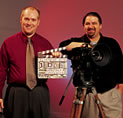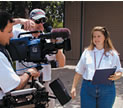 |
|||||||||||||||||
 |
|||||||||||||||||||||||||
|
|
AT AGE 11, BUCKNER COOKE ('96) AND TWO FRIENDS had already created short films with an 8 millimeter camera. “We called ourselves BRC — Buckner, Randy and Charlie — Productions,” he says. But Cooke didn’t think he could become a professional filmmaker. He entered UNT to study history and political science. During his first semester, however, he noticed the Department of Radio, Television and Film’s listings in the course catalog. “That weekend, I drove home and told my parents I was changing my major,” he says. “I thought I’d have to go to NYU or UCLA to go to a good film school. Now I honestly believe UNT has one of the better film schools in the country.” He now owns Red Frame Productions in Austin. In the past two years, the company has produced short documentaries on Texas bands and musicians as well as one about the Broken Spoke, Austin’s oldest country and western club. Cooke also created a documentary about a Vietnam War veteran, using actual film shot by the soldier during the war.
Unexpected careers Cooke isn’t the only alumnus who didn’t expect to make a living through his hobby.
Gary Mayes (’86) was a real estate major. Pete Wagstaff (’94) earned a degree in music theory and is now working on a master’s degree in communication studies. Both created films as a respite from classes. During his freshman year, Mayes wrote The Fallen Angel, an action drama about a man trying to leave a gang. “I started writing scripts when I was in junior high. I thought the movies that Hollywood produced were bad and I could do better,” says Mayes, now owner of Suave Productions in Las Colinas. But at UNT, Mayes had no budget and little equipment for a film. He received encouragement and help from his brothers in Phi Kappa Sigma fraternity, particularly Alan Klenk (’85), the fraternity’s president, and Vaughan Garrett (’86), Mayes’ suitemate in Kerr Hall. Klenk helped with the movie’s script, and Garrett, now owner of Sight and Sound Productions in Dallas, shot the film and contributed to the soundtrack. Mayes also received permission to use the Department of Radio, Television and Film’s editing facilities and sound stages. “Then the NT Daily did a story about us, and before we knew it, we had 200 people working on the movie, including almost the entire fraternity,” he says. Wagstaff directed The Reluctant Hitman after he met Keith Reeves (’98), who would become the film’s producer, in a film production class in 1996. “I’ve been an artist all my life and wanted to do something creative,” Wagstaff says. “A light came out of the sky and said, ‘Go be a filmmaker.’ I took film courses with the intention of earning a second bachelor’s or a master’s degree.”
Improvising behind the camera The Reluctant Hitman focuses on a man mistaken for an assassin. The dark comedy has been shown at the Ridglea Theater in Fort Worth, the Studio Movie Grill in Plano and at UNT. It was released on video in July through Dreamcatcher Entertainment. Reeves says the crew had to learn on the job. “One of our challenges was finding enough money for expenses. Pete even sold his musical instruments,” he says. Although 100 people, including professional actors, eventually worked on the film, Reeves and Wagstaff both took on many jobs in addition to producer and director. “When we were on location in Albuquerque, I cooked the food. We couldn’t afford a caterer,” Reeves says. He and Wagstaff also became extras in the film. “The sound guy was also an extra. He was sitting on a bench reading a newspaper, and the newspaper hid the microphone,” Wagstaff says.
Cindy Quandt-Guerra (’85), assistant director of operations for OMM Productions in Dallas, has also improvised many times during a shoot. Producing documentaries for the Salvation Army, she has traveled to Russia, India, Zimbabwe, Japan and Honduras, among other countries. Suspicious governments prevented Quandt-Guerra and her crew from bringing their Betacam equipment into some countries. “We had to buy a small digital camera and go in as tourists,” she says. Lack of electricity is often a problem. “We’ve blown fuses and had to go to the state TV stations and beg for more,” she says. “Getting to a location can be a big problem, too. In Honduras, we shot footage of families impacted by Hurricane Mitch, and it took hours over washed-out roads to get to the villages.”
More than entertainment Quandt-Guerra, who has won several awards for her work, says she always wanted to produce documentaries instead of feature films. “Seeing how the Salvation Army is helping people throughout the world and capturing that on video is rewarding,” she says. “It feels like I’m making a difference.” Cooke says taking Ben Levin’s documentary classes in the Department of Radio, Television and Film made him think less about becoming like “another Martin Scorsese or Robert Altman.” “A documentary has a little more social value than a feature film, and it doesn’t take as many people to create one,” he says.
Jo Streit (’90 M.A.) also appreciates the social value of documentary films. She created and directed Flirting With Power, an 88-minute film that follows Ross Perot’s presidential campaign staff from the start of his campaign in 1992 through the start of the Reform Party and presidential election in 1996. “Most people with no political experience don’t land key campaign jobs, but this was different,” Streit says. “It was a moment in time to tell a great story and see how our nation’s political process really works.” Streit formed a production company, Just Right Productions, during the shooting. She and her crew received access to areas often restricted to the press, and Perot allowed her to use his personal videotape archives. Screened at this year’s Dallas Video Festival, Flirting With Power has also been shown on high school and college campuses. It will be shown at UNT in October. Streit says the film has received support from the Reform Party, despite not always painting a flattering picture of Perot. Not a member of the party, she was nonetheless chosen to speak at last year’s national convention.
Inspired by UNT Many alumni filmmakers say the contacts they made as students benefited their careers. Quandt-Guerra completed a student internship at OMM Productions before being hired full time. “The internship made all the difference,” she says. “In addition, my UNT classes were unconventional, and that was good — the professors expected us to go beyond book learning.” Cooke says his professors inspired him, and older students in the department mentored him. “Getting into the documentary film workshop and directing a film were my goals at UNT. I’m very proud I did both,” he says. “I developed myself both as a filmmaker and an individual.” Wagstaff and Reeves are beginning a new film about musicians. Although still working day jobs, they hope to become full-time independent filmmakers. “I have stories to tell that mean something to me,” Reeves says. Mayes thought he’d sell houses after graduation. That changed when Phyllis Diller called. The comedienne had seen The Fallen Angel and asked Mayes to assist her with a TV series pilot. He worked with other Hollywood celebrities for three years before returning to Texas. His latest project is www.popculturetoday.com, a television series — and a web site — about pop culture memorabilia. “UNT
was very conducive to creativity, and I thrived on it,” he
says.
|
||||||||||||||||||||||||



